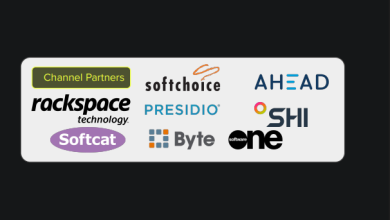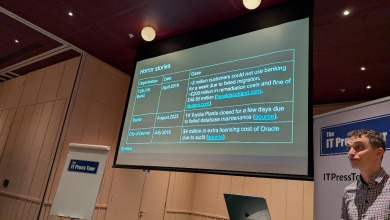IT Europa attended the IT Press Tour across Silicon Valley, California last week, which helped unveil a number of potential channel opportunities.
We previously covered the latest channel openings from data management and analytics firm Alation, and those from the announcement made jointly by BMC and Oracle around their closer cloud services relationship.
Here are a few others from the Tour.
SambaNova
SambaNova is an AI data processing company that is attempting to make a big impact with its Dataflow-as-a-Service offering. It has developed its own AI chips, but doesn't sell those separately like other companies do. Instead, it concentrates on winning big AI processing deployments for its platform across government departments, financial services and enterprises, for instance.
SambaNova won't reveal the number of its customers or its current annual turnover, but it completed a Series D funding round last year, that valued the company at $5 billion. It employs 500 globally and competes against the likes of Nvidia and Intel in the AI processing space.
One of its customers is Hungarian bank OTP, which has over 40,000 employees and 17m customers. OTP deployed and put into production the SambaNova platform in under three months, and claims to be building the “fastest supercomputer for AI in Europe”.
Whatever the veracity of that claim, it is clear there will an evolving opening for system integrators building services around SambaNova's technology in the years ahead. It was hinted at the IT Press Tour presentation that SambaNova won the OTP deal against leading AI chip vendor Nvidia.
GridGain
Another company generating increasing system integration business is GridGain, which provides an in-memory computing platform (IMCP) built on the open source Apache Ignite system, which GridGain originally developed.
While companies recognise the benefits of an IMCP, many lack the in-house skill sets to deploy and manage one, says GridGain. That's why it recently launched its Nebula offering, to make deploying and maintaining a high-performance data environment “easy and cost effective”.
Available as a self-service SaaS model in the cloud or as a fully managed service on-premise or in cloud, companies can now focus on building apps, without having to worry about managing or scaling clusters, the vendor says.
GridGain customers already include the likes of American Express and Barclays Bank. And SIs offering the technology with their own platforms and services include IBM, which sells GridGain with its mainframe solutions, and Tata Consultancy Services, which bundles GridGain alongside its IT modernisation services. GridGain says it is seeking more of these deals going forward.
FlashGrid
FlashGrid started as software-defined storage for Oracle databases on standard servers, but customers increasingly want to move their databases into the cloud. FlashGrid promises them the high availability and high performance they need to successfully do it.
Its solution is sold on the Azure, AWS and Google Cloud marketplaces on a pay-as-you-go basis, and FlashGrid says it is looking for more partners to help sell the solution. Already, half of its deployments are through partners, and the company expects “greater market traction” this year, as larger companies move their databases into the cloud.
SingleStore
SingleStore is a cloud-native database that has received big investments from the likes of IBM, Dell and HPE, who see SingleStore as an ideal solution among their own cloud offerings.
It is aiming for annual sales of $1 billion within five years, through 70% annual growth up to that point.
If the “scalable”, relational SQL database reaches these sales in a similar time frame that data backup firm Veeam did, we can expect to see a similar burgeoning channel evolving. Uber and Hulu are already users of the database.
Observe
Observe is a company that allows organisations to “curate and relate” their data to glean faster insights into their business, “that their people can actually understand”. It so far has 40 customers, took in around $2m in sales last year, and has completed a $15m Series A funding round.
Customers pay according to how much they use the system, buying credits in advance that have to be replaced as they interrogate more data. All Observe's existing customers were sold to direct, but it expects to bring in partners as its operations scale up.
Hazelcast
Hazelcast is largely a hidden gem in the financial services industry, where 60% of its undisclosed sales come from. Another 20% of business comes from e-commerce.
It's largely hidden as a supplier as very few of its customers publicly say they use its Java Virtual Machine-based transactional technology. The company itself claims a “third of the world's payments go through Hazelcast”.
While most of the firm's business is direct at the moment, it has an established services relationship with IBM, and expects to do more of this type of business as it grows its “real-time” use case opportunities.
It aims to bring more personalisation to real-time transactions, like it has at BNP Paribas in Poland. There, if customers are refused immediate funds, they are instead offered loans, and loans business at this unit has shot up.
If similar use cases take off, it is expected that more system integrators will become involved in the near future.


